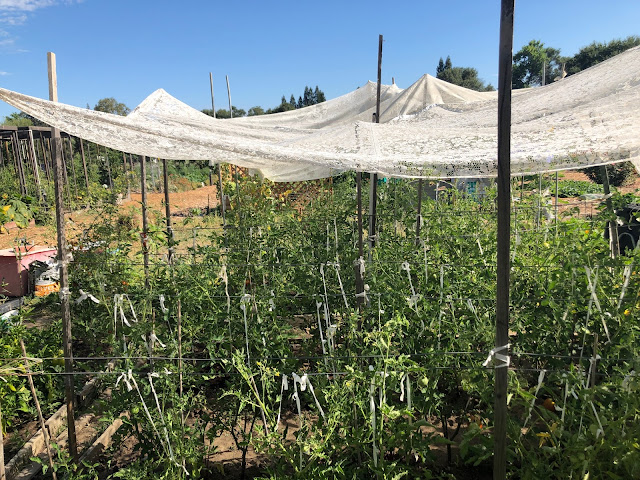
|
|
One of the more whimsical solutions I've seen to our August sun: Lace tablecloths strung on stakes over a community
garden plot. (Photo: Kathy Morrison)
|
Poor or outdated advice keeps getting passed on, unfortunately
Gardening is an anecdotal art. Knowledge is passed along to home gardeners from family members, neighbors, the folks at the nursery and, nowadays, friends on social media. But that information isn't necessarily the best answer, and might be downright wrong. Information also changes as new research is done. Example: Early in my gardening career I doused each new plant with vitamin B1, because I was told it prevented transplant shock. But research no longer supports that practice, UC and other experts say.
Here are a few myths that are bad advice:
Myth #1: If your plant is droopy, it needs water.
Water is not the answer to every problem. Check the soil moisture first! And not just on the top, look several inches down where the roots are. Get a moisture meter to make that even easier. And realize that lots of things cause plants to droop, but sometimes it's just how they cope with hot weather (tomatoes and squash are known for this). In that case, they should look perky again in the morning. If not, and the soil is dry, THEN give them some water.
Myth #2: Use neem oil to fix whatever's wrong with that plant.
Not even close. Neem oil is a botanical oil, derived from the tropical neem plant. As such, it's considered a low-toxicity pesticide. It's effective as a fungicide to cure powdery mildew, and is listed as a miticide and insecticide for a number of pests. But it doesn't kill caterpillars, for example, and it is considered a moderate threat to honeybees. For it to be effective against fungus, you have to thoroughly spray the plant, and may have to come back as soon as every seven days. And you generally kill only the insects -- whiteflies, for example -- that are directly sprayed. So research your problem -- it may not require a pesticide, and we lovers of nature should aim to avoid pesticides if possible. If you do decide to use neem oil, READ THE LABEL first. If your problem or pest is not on the label, back away: It's unlawful to apply a pesticide for an unlisted use.
Myth #3: Anything grows in Sacramento.
Well, we can grow a lot of things here, certainly. Against the odds and the zone charts, gardeners here even manage to grow things like bananas and bougainvillea. But should you? It might be a personal challenge, sure, but also may take more resources and cash -- not to mention weather protection, pesticides and fertilizers -- than is wise.
Myth #4: "Full sun" means "full sunlight."
Oh, has this one been a hard lesson over the years. A lot of plants that enjoy summer temps cannot handle the intensity of Sacramento sunlight in mid to late afternoon. Tomatoes burst, peppers and melons get sunburned, and rosebuds blow out in hours. I've learned to be prepared with shade cloth, at the very least, or put plants in places where there will be some afternoon shade, such as against a fence.
Myth #5: Clay soil is bad soil.
We have a lot of clay in the Sacramento region. As noted, a lot of things grow well here. So, gee, somehow people have learned to use this supposedly bad soil to yield lots of crops, trees and flowers. The reality is clay is challenging -- especially when it dries brick-hard in mid-summer -- but it's not bad. It is composed of tiny particles. When it does get water, it holds it really well, unlike sand, which lets water slip right through it. This water-holding property is especially good for summer crops like tomatoes, corn and squash. If you work some compost or other organic material into clay, those tiny particles break up a bit, letting in air and giving roots an easier time when growing.
Do you have a garden myth you've learned is fiction? Share it with us at Sacramento Digs Gardening, sacdigsgardening@gmail.com.

